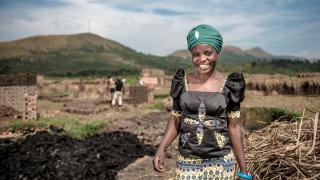‘Men can take many wives; we can’t register our children’
Why women in eastern DRC are campaigning for marriage registration
A marriage certificate might sound like just a piece of paper, but for marginalised women in eastern DRC, it’s an important step towards greater security, self-reliance and securing rights.
“The two most common problems we find in our village are women’s inheritance rights and men getting married to many women”, says Alice, a graduate of our 12-month training programme in DRC who, after participating in an intensive course to build her leadership and advocacy skills, now works as a ‘Change Agent’ in her community of Mumosho. Change Agents form small local groups to identify common barriers facing women in their area and develop action plans to bring them down.
The two issues Alice observes in Mumosho - inheritance and marriage practices - are closely connected.
Most marriages in eastern DRC follow traditional customs and are not contracted under national laws. As a result, women have no legal protection and no rights to property, inheritance or child custody.
This means that they are left particularly vulnerable if they divorce or separate from their husbands or after the death of a spouse. They often face eviction from their homes, seizure of their land, and spiralling poverty.
Inequality is further reinforced by deep-rooted patriarchal cultural norms whereby men can take multiple wives, who then compete for resources. Polygamy has been described by the UN’s Committee on the Elimination of Discrimination against Women (CEDAW) as a contravention of women’s rights, due to the serious emotional and financial consequences for women and children – including heightened risks of poverty and domestic violence.
Furthermore, without regulation or registration of customary marriages, there is no check against young girls being forced to wed, despite laws against underage marriage. According to UNICEF, 37% of girls in DRC are married before the legal age of 18, and 10% are married by their 15th birthday.
The children of unregistered marriages are also negatively affected. A marriage certificate is one of the requirements for registering a child’s birth in DRC and therefore having access to government services (such as healthcare and education), inherit property, and vote. Only 25% of children in DRC have a birth certificate, and the rights and protections it affords.
Further reading
My Name is Cinama
subtitle:
After graduating from our 12 month programme in the Democractic Republic of Congo, Cinama went on to start her own brickmaking business. She now shares her knowledge with other women and is looked up to as a role model.
Our Global Advocacy Manager, Stephanie Siddall, discusses global progress towards gender equality and what more we must do to ensure that the most marginalised women and girls aren't left behind.
To mark the International Day for the Elimination of Sexual Violence in Conflict, we spoke to two women in our training programme who have chosen to speak out about their experiences.

